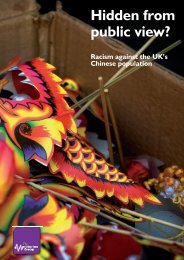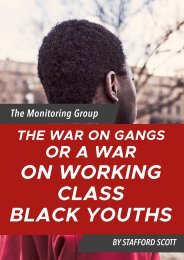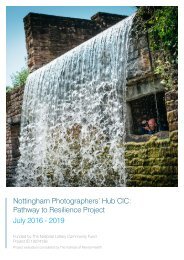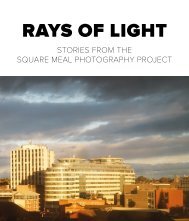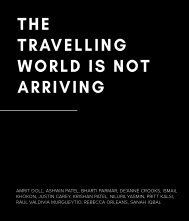Coming of Age : 1976 and the Road to Anti-Racism
Coming of Age : 1976 and the Road to Anti-Racism by Jagdish Patel and Suresh Grover
Coming of Age : 1976 and the Road to Anti-Racism
by Jagdish Patel and Suresh Grover
Create successful ePaper yourself
Turn your PDF publications into a flip-book with our unique Google optimized e-Paper software.
<strong>Coming</strong> <strong>to</strong> Engl<strong>and</strong> marked a changing point, because it was here that I was called a<br />
‘Paki’ for <strong>the</strong> first time. Although I was involved in anti -racist politics in America, it was quite<br />
different <strong>to</strong> be called a ‘Paki’ yourself, it affects you personally, <strong>and</strong> at <strong>the</strong> level <strong>of</strong> <strong>the</strong> subjective<br />
experience it is a question <strong>of</strong> <strong>the</strong> difference between expressing solidarity with ano<strong>the</strong>r<br />
group as opposed <strong>to</strong> facing racial abuse directly yourself. I was quite shocked <strong>and</strong> taken<br />
aback. This event set me on <strong>the</strong> path <strong>of</strong> anti- racist work here in Britain, <strong>and</strong> also socialist politics<br />
as well. My family wasn’t particularly political, I was <strong>the</strong> only one, but nor were my family<br />
right wing or anything like that so it wasn’t a big problem that I was political. I think <strong>the</strong>y just<br />
saw me as ra<strong>the</strong>r eccentric. Although my fa<strong>the</strong>r wasn’t involved in politics, I think he might<br />
have been a political person in a different era. He supported my desire for education though<br />
he wasn’t very happy about my going <strong>to</strong> America but when one <strong>of</strong> my teachers talked <strong>to</strong> him<br />
in my support he was fine about it. I found my fa<strong>the</strong>r <strong>to</strong> be a supportive influence in my life.<br />
How did you end up in Southall in <strong>1976</strong>, <strong>and</strong> what were <strong>the</strong> political dynamics?<br />
I came <strong>to</strong> Britain in 1971 <strong>and</strong> lived in London for a while <strong>and</strong> <strong>the</strong>n went <strong>to</strong> work in Bris<strong>to</strong>l.<br />
I was doing my PhD <strong>and</strong> working part time, undertaking research in <strong>the</strong> area <strong>of</strong> what was<br />
<strong>the</strong>n described as ‘ethnic relations’, <strong>and</strong> came <strong>to</strong> Southall in <strong>1976</strong> <strong>to</strong> do field work for my PhD<br />
<strong>the</strong>sis. What I remember particularly about that year was that it was a very hot summer. In<br />
Southall, I was doing comparative research interviews with Asians <strong>and</strong> White people about<br />
intergenerational change. My focus was on <strong>the</strong> similarities <strong>and</strong> differences between what<br />
young people <strong>and</strong> <strong>the</strong>ir parents thought across ethnicity boundaries. I was talking <strong>to</strong> young<br />
people about <strong>the</strong>ir educational experiences <strong>and</strong> <strong>the</strong>ir experiences at home in Southall, <strong>and</strong><br />
through our conversations I began <strong>to</strong> recognise that racism was a critical issue affecting<br />
<strong>the</strong> lives <strong>of</strong> <strong>the</strong>se young people. So although my <strong>the</strong>sis was about intergenerational change<br />
ra<strong>the</strong>r than about racism per se, never<strong>the</strong>less racism emerged as an important fac<strong>to</strong>r. When<br />
Gurdip Chaggar was killed in Southall that summer, I was shocked <strong>and</strong> began <strong>to</strong> realise how<br />
critical <strong>the</strong> situation was. My job contract in Bris<strong>to</strong>l came <strong>to</strong> an end before I could finish <strong>the</strong><br />
PhD so that a year later in 1977 I moved <strong>to</strong> Southall <strong>to</strong> take up a new post with <strong>the</strong> National<br />
Association <strong>of</strong> Asian Youth.<br />
From 1977 onwards, as I started working at <strong>the</strong> National Association <strong>of</strong> Asian Youth I<br />
came <strong>to</strong> meet politically conscious young people <strong>and</strong> o<strong>the</strong>r activists in Southall. Two organisations<br />
were particularly active: <strong>the</strong> Southall Youth Movement <strong>and</strong> <strong>the</strong> Indian Workers Association.<br />
There were some tensions between <strong>the</strong> leadership <strong>of</strong> <strong>the</strong>se two organisations. The<br />
IWA had been a left leaning organisation in relation <strong>to</strong> working- class politics in fac<strong>to</strong>ries etc;<br />
<strong>and</strong> whilst <strong>the</strong>se concerns were still around in <strong>1976</strong> <strong>the</strong>y did not hold <strong>the</strong> same significance<br />
for young people. SYM seemed <strong>to</strong> feel <strong>the</strong> IWA had changed <strong>and</strong> it was not so radical anymore.<br />
SYM was more concerned with street level everyday racist conflict <strong>and</strong> questions <strong>of</strong><br />
policing <strong>and</strong> so on. I should say that <strong>the</strong> membership <strong>of</strong> SYM was mostly young men, <strong>the</strong>re<br />
128 | <strong>Coming</strong> <strong>of</strong> <strong>Age</strong><br />
<strong>Coming</strong> <strong>of</strong> <strong>Age</strong> Final version 16.10.indd 128 17/10/2017 12:08



